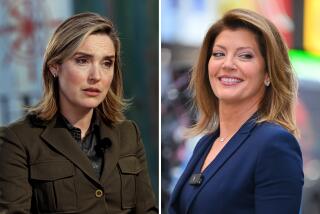Republican candidates debate about debates and fail to agree
- Share via
During the last few days I have had a relatively cordial email exchange with a conservative reader of my column. In this polarized era, that is about as rare as a Republican presidential debate with no shouting or name calling. In fact, the most recent GOP debate on CNBC was the topic of the email exchange and the reader, who identified himself as a Hollywood lawyer, took me to task for not taking seriously the criticism that the debate moderators’ questions were too antagonistic.
“As a lawyer, I laugh every time I read in the paper about someone’s ‘withering’ cross-examination of a witness,” the reader wrote. “All that ever means is that the lawyer was domineering, loud, and mean. It has nothing to do with the actual effectiveness of the questioning. Same thing here -- a ‘tough’ question does not have to be asked with a ‘tough’ attitude, in fact it detracts from the question itself. CNBC embarrassed journalism, or what counts for it these days ...”
I wrote back, acknowledging he made a good point. In fact, during the debate it had struck me that some of the questions were posed in such a purposely provocative way that they made it easy for the targeted candidate to claim offense and evade an answer. This was unfortunate because it was perfectly reasonable to expect Ben Carson to explain his very unrealistic tax plan or to ask Donald Trump if his campaign is about anything but loud, gassy promises to “make America great again.” These are the party’s two front-runners, after all, and they need to start adding policy detail to their personality-driven campaigns. The snarky way questions were posed, however, let them off the hook and turned the questioners into easy targets.
In the wake of the CNBC controversy, representatives of the various GOP candidates engaged in discussions about how future debates should be managed, but collaboration quickly unraveled. Each candidate has a different interest, it seems. Carson wants a format that would allow the candidates to take up most of the time with prepared statements, something reminiscent of a candidates forum in a school board election. Texas Sen. Ted Cruz wants to pick debate moderators who are sympathetic to the conservative cause. Louisiana Gov. Bobby Jindal and South Carolina Sen. Lindsey Graham wanted any plan that would get them on the main stage with everyone else, instead of being relegated to the “kids table” preliminary debate. That is the last thing Trump wants and now he is busy cutting his own deal with the networks.
Perhaps with the exception of New Jersey Gov. Chris Christie, who said he will take any question from any moderator anytime, the candidates naturally prefer any format change that might make it easier for them to present their best selves to voters without a moderator intruding on their message. Voters, though, would be less than well-served by a questioner who is no more engaged than the voice on a car’s GPS system.
My pen pal, the Hollywood lawyer, said he would like to see moderators who understand their job is “to prompt candidate discussion and generally control that discussion, not to conduct interrogations.” That is the traditional role moderators once played, but now that the early debates have been given over to cable news, it is not easy to maintain that standard. Cable news is an arm of show business. It’s about personalities, staged drama and lots of shouting. If anyone were serious about having serious debates, we would go old school and round up a panel of smart but colorless newspaper reporters to present informed, dispassionate questions, but that is not going to happen because it would bump the cable news celebrities out of the spotlight and hurt the ratings.
The problem is not really the liberal media, it’s the glamorized media, whether left, right or center. When the folks doing the questioning are more famous than most of the candidates, the balance is skewed even before the first question gets asked. For entertainment value, it would be tremendous to have Rush Limbaugh, Bill O’Reilly and Ann Coulter run a debate (Ted Cruz would be elated!), but it would hardly be an affair devoid of snarkiness, bias or “gotcha” questions.
It will be interesting to see if anyone can come up with a better debate scheme. My prediction: With so many debates still to come, so many candidates still on the stage and so much advertising revenue at stake, what we’ve had is what we’ll get. We will not see anything close to Lincoln vs. Douglas or Nixon vs. Kennedy until the number of candidates has been whittled down to two.
More to Read
A cure for the common opinion
Get thought-provoking perspectives with our weekly newsletter.
You may occasionally receive promotional content from the Los Angeles Times.










